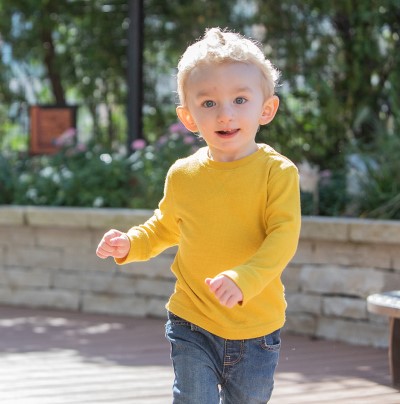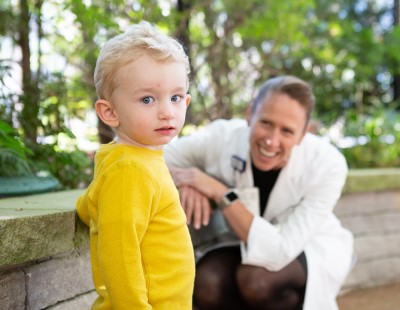 When 3-month-old Hank Matzke started running a fever and wouldn’t stop crying late one Saturday night, his parents, Amanda and Ryan, knew something was seriously wrong.
When 3-month-old Hank Matzke started running a fever and wouldn’t stop crying late one Saturday night, his parents, Amanda and Ryan, knew something was seriously wrong.
“He was uncontrollably fussy and wasn’t acting like himself,” Amanda says. “He was irritable and didn’t want to be held or touched.”
By the time the new parents reached the St. Louis Children’s Hospital emergency department, Hank’s fever had spiked to 104°F.
“Having a baby who was fussy and had a fever didn’t give the doctors a good starting point,” Amanda says. “They had a lot to rule out, which took time—time we didn’t feel we had.”
After numerous tests, including a spinal fluid test, doctors determined Hank had meningitis but they weren’t yet sure what type. That information was key so they could administer the right antibiotic to fight the meningitis and prevent lasting damage.
Meningitis, an infection of the membranes that protect the brain and spinal cord, strikes suddenly and worsens quickly. In addition to swelling, these membranes can become scarred, causing long-term effects, including hearing loss, brain damage, and delayed motor skills.
“Able to Breathe Again”
With a start on a diagnosis, Hank was admitted to St. Louis Children’s Pediatric Intensive Care Unit (PICU), which includes a specially trained health care team and state-of-art technology.
In addition to his high fever, Hank had hydrocephalus. “It was incredibly scary to hear his brain was swelling,” Amanda says. “Our worries were that he could have hearing loss, stroke, brain damage or even death.”
In the PICU, the Matzkes met Mary Hartman, MD, MPH, a Washington University pediatric critical care specialist at St. Louis Children’s. She would become an important part of their lives for the next two years.
“Dr. Hartman made us feel more calm about all the doctors in Hank’s room and the tests,” Amanda says. “She let us know how confident she was that the team would take care of Hank and he would be going home. That is all I needed to hear to be able to breathe again.”
 Within 48 hours of Hank arriving at the hospital, Drew Schwartz, MD, a Washington University infectious disease specialist at St. Louis Children’s, had solved the mystery of what kind of meningitis Hank had. It was a rare Salmonella meningitis, which can be life-threatening and has a high rate of complications.
Within 48 hours of Hank arriving at the hospital, Drew Schwartz, MD, a Washington University infectious disease specialist at St. Louis Children’s, had solved the mystery of what kind of meningitis Hank had. It was a rare Salmonella meningitis, which can be life-threatening and has a high rate of complications.
Thankfully, with the pinpointed diagnosis and targeted antibiotics Hank’s brain swelling gradually went down with no shunt or other surgical intervention needed.
Follow-Up Program Offers Long-Term Support
After 14 days of receiving continuous intravenous antibiotics in the PICU, Hank was ready to go home. But not without ongoing care and guidance from the Neurocritical Care Clinic team at St. Louis Children’s.
Launched in 2017, the Neurocritical Care Clinic is a follow-up program for children who have been in the PICU. The program, led by Dr. Hartman, is one of the few in the country and the only one in the region.
Once home, Hank required another 30 days of intravenous antibiotics through a PICC line, a central catheter that allows long-term access to a vein.
“We were on our own at home but our PICU nurse, Sarah, provided us with all the supplies we needed and showed us how to clean the PICC line,” Amanda says. “As part of the Neurocritical Care Clinic, she also coordinated physical therapy for Hank in our home.”
Hank was closely monitored through the clinic for the first two years after his PICU stay to make sure his brain swelling had subsided and he passed his hearing tests. He was also tested to confirm he had no developmental delays.
Remarkably, Hank shows no long-term side effects from meningitis.
“He is rambunctious, smart and very aware of everything,” Amanda says.
She is grateful for the follow-up care and ongoing communication with Dr. Hartman, Dr. Schwartz and the nurses after Hank left the hospital. “They were always available and gave us access to answers. The team made it easy for us—the whole hospital made things easier for us. You’re not just another patient at St. Louis Children’s Hospital. Seeing the same faces who know your child and building connections face-to-face with the health care team is huge for families.”
A Reassuring Champion for Parents and Patients
The Neurocritical Care Clinic program is designed to help children who are at highest risk of neurocognitive or neuropsychological issues, including those who have had brain injuries from stroke, seizures or trauma.
“We found as families were transitioning home after being in the PICU, they had a huge adjustment,” Dr. Hartman explains. “They go from a supportive, intensive environment surrounded by health care professionals to being on their own at home as they deal with continuing issues. Parents were often frightened and were struggling with their own psychological trauma from their children’s illnesses.”
Dr. Hartman and her colleagues felt strongly that their responsibility to families didn’t end at PICU discharge. Through the program, the team makes sure parents are cared for, too. “We help them feel less burdened and let them know they’re not alone,” Dr. Hartman says. “This program is as much for the parents as the kids.”
After traumatic brain injuries or other trauma that leads to a stay in the PICU, children often have lingering issues with sleep, anxiety, or school that can be difficult for parents to manage. “It’s such a joy to be able to tell parents they aren’t in this by themselves,” Dr. Hartman says. “The program is designed purely to benefit families. I feel privileged to be part of it and proud to be paving the way for others.”
She says more than 80% of children who come through the clinic leave with new recommendations related to school or for other therapies or medications. “We’re helping to arm parents to advocate for their kids at school. Our role is to be their champion.”
For patients who have traveled from out of town, the team arranges follow-up care with the patients’ community resources.
Several other hospitals have inquired about how to create a similar program. “Not many hospitals are able to offer this clinic but we can because we have the generous support of donors to St. Louis Children’s Hospital Foundation,” Dr. Hartman says. “This support allows us to tell our young patients that they’re our personal responsibility until they become adults. It’s pretty unique to offer that continuity of care throughout childhood.”
The follow-up rate through the Neurocritical Care Clinic is 90%, a high rate for any follow-up care program. “The reason the program succeeds is that we spend so much time getting to know families when children are inpatients,” Dr. Hartman says. “Then their follow-up appointment is like a homecoming. They know us and know we genuinely care about them and how they’re doing.”

